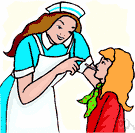sick 1
(sĭk)sick 2
(sĭk)sick
(sɪk)sick
(sɪk)sick
(sɪk)adj. -er, -est.
sick
- anointing of the sick - The Catholic sacrament in which a priest anoints a dying person with oil and prays for salvation.
- decumbiture - The act of going to bed when sick.
- ill - Originally meant not "sick" but "bad," and was borrowed from Old Norse illr; the sense of "sick" arrived in the 15th century.
- nauseous, nauseated - Nauseous ("sickening") is an adjective describing something that causes nausea; the adjective for the feeling ("made sick") is nauseated.
ill
– sickIll and sick are both used for saying that someone has a disease or some other problem with their health. You can use either ill or sick after a linking verb.
You usually use sick, rather than 'ill', in front of a noun.
However, you often use ill in front of a noun when you are also using an adverb such as seriously, chronically, or terminally.
Be Careful!
The usual comparative form of ill is worse.
To be sick means to bring up food from your stomach.
Be Careful!
Don't use 'ill' or 'sick' to say that someone has received an injury. Say that they are injured or hurt.
sick
A sick person has an illness or some other problem with their health.
In British English, to be sick usually means to bring up food through your mouth from your stomach.
In American English, to be sick means to be ill.
Be Careful!
Be sick meaning 'be ill' cannot be used in progressive forms. 'George is being sick' means 'George is bringing up food from his stomach'.
If you vomit, you bring up food through your mouth from your stomach. Vomit is a fairly formal word.
In conversation, some people say throw up instead of 'be sick'.
In British English, to feel sick means to feel that you want to vomit.
In American English, if someone feels sick, they feel ill.
sick
Past participle: sicked
Gerund: sicking
| Imperative |
|---|
| sick |
| sick |
| Noun | 1. |  sick - people who are sick; "they devote their lives to caring for the sick" sick - people who are sick; "they devote their lives to caring for the sick"people - (plural) any group of human beings (men or women or children) collectively; "old people"; "there were at least 200 people in the audience" |
| Verb | 1. |  sick - eject the contents of the stomach through the mouth; "After drinking too much, the students vomited"; "He purged continuously"; "The patient regurgitated the food we gave him last night" sick - eject the contents of the stomach through the mouth; "After drinking too much, the students vomited"; "He purged continuously"; "The patient regurgitated the food we gave him last night" |
| Adj. | 1. | sick - affected by an impairment of normal physical or mental function; "ill from the monotony of his suffering" unfit - not in good physical or mental condition; out of condition; "fat and very unfit"; "certified as unfit for army service"; "drunk and unfit for service" unhealthy - not in or exhibiting good health in body or mind; "unhealthy ulcers" |
| 2. | sick - feeling nausea; feeling about to vomit | |
| 3. |  sick - affected with madness or insanity; "a man who had gone mad" sick - affected with madness or insanity; "a man who had gone mad"insane - afflicted with or characteristic of mental derangement; "was declared insane"; "insane laughter" | |
| 4. |  sick - having a strong distaste from surfeit; "grew more and more disgusted"; "fed up with their complaints"; "sick of it all"; "sick to death of flattery"; "gossip that makes one sick"; "tired of the noise and smoke" sick - having a strong distaste from surfeit; "grew more and more disgusted"; "fed up with their complaints"; "sick of it all"; "sick to death of flattery"; "gossip that makes one sick"; "tired of the noise and smoke"displeased - not pleased; experiencing or manifesting displeasure | |
| 5. | sick - (of light) lacking in intensity or brightness; dim or feeble; "the pale light of a half moon"; "a pale sun"; "the late afternoon light coming through the el tracks fell in pale oblongs on the street"; "a pallid sky"; "the pale (or wan) stars"; "the wan light of dawn" weak - wanting in physical strength; "a weak pillar" | |
| 6. | sick - deeply affected by a strong feeling; "sat completely still, sick with envy"; "she was sick with longing" | |
| 7. |  sick - shockingly repellent; inspiring horror; "ghastly wounds"; "the grim aftermath of the bombing"; "the grim task of burying the victims"; "a grisly murder"; "gruesome evidence of human sacrifice"; "macabre tales of war and plague in the Middle ages"; "macabre tortures conceived by madmen" sick - shockingly repellent; inspiring horror; "ghastly wounds"; "the grim aftermath of the bombing"; "the grim task of burying the victims"; "a grisly murder"; "gruesome evidence of human sacrifice"; "macabre tales of war and plague in the Middle ages"; "macabre tortures conceived by madmen"alarming - frightening because of an awareness of danger |
sick
unwell well, fit, healthy, fine, robust, fit and well, up to par, hale and hearty, fit as a fiddle, able-bodied
sick
adjectivesick
[sɪk]your uncle is very sick → tu tío está muy enfermo
to call in sick = to phone in sick
to fall sick (o.f.) → enfermar, caer enfermo
to go sick → faltar por estar enfermo (al colegio, trabajo, etc); (with a medical certificate) → estar de baja
to make sb look sick (US) (fig) (= appear inferior) → hacer parecer poca cosa a algn
the Romanians made our team look sick → los rumanos dejaron a nuestro equipo muy atrás, el equipo rumano era como para darle complejo a nuestro equipo
to be off sick → faltar por estar enfermo (al colegio, trabajo, etc); (with a medical certificate) → estar de baja
she phoned in sick → llamó para decir que estaba enferma
to be sick at heart (o.f., also liter) (= despondent) → estar angustiado
see also worried 1
see also worry
to be sick (Brit) (= vomit) → devolver, vomitar
to feel sick (Brit) (= nauseous) → tener ganas de devolver or de vomitar, tener náuseas
flying makes me feel sick → ir en avión me produce mareo or náuseas
to make sb sick (lit) → hacer devolver or vomitar a algn
to make o.s. sick (deliberately) → hacerse vomitar or devolver
you'll make yourself sick if you eat all those sweets → te vas a poner malo si comes todos esos caramelos
to be as sick as a dog → echar las tripas, echar la primera papilla
see also airsick, seasick, travel-sick
to be sick of (doing) sth → estar harto de (hacer) algo
to be sick and tired or sick to death of (doing) sth → estar hasta la coronilla de (hacer) algo, estar más que harto de (hacer) algo
to be sick of the sight of sb → estar más que harto de algn
to be as sick as a parrot (Brit) → sentirse fatal
I feel sick about the way she was treated → me asquea la forma en que la trataron
it makes me sick the way they waste our money → me pone enferma ver la manera en que malgastan nuestro dinero
she's never without a boyfriend, makes you sick, doesn't it? → siempre tiene algún novio, da rabia ¿no?
it's enough to make you sick → es como para sacarle a uno de quicio, es como para desesperarse
you make me sick! → ¡me das asco!
it makes me sick to my stomach → me revienta, me da ganas de vomitar
sick building syndrome N → síndrome m del edificio enfermo
sick leave N to be on sick leave → tener permiso or (Sp) baja por enfermedad
sick list N → lista f de enfermos
to be on the sick list → estar de permiso or (Sp) de baja por enfermedad
sick note N → justificante m por enfermedad
sick pay N pago que se percibe mientras se está con permiso por enfermedad → baja f (Sp)
sick
[ˈsɪk] adjHe was sick for four days → Il a été malade pendant quatre jours.
to fall sick → tomber malade
to be off sick → être en arrêt maladie
to be worried sick → être mort(e) d'inquiétude
violently sick → en proie à de violentes nausées
to feel sick → avoir mal au cœur, avoir envie de vomir
I feel sick → J'ai mal au cœur., J'ai envie de vomir.
That's really sick! → C'est vraiment de mauvais goût!
I'm sick of your jokes → J'en ai assez de tes plaisanteries.
to be sick of doing sth → en avoir assez de faire qch
to be sick and tired of sth → en avoir plus qu'assez de qch
sick
sick
:sick
:sick
[sɪk]a sick person → un(a) malato/a
to fall or take sick → ammalarsi
to be (off) sick (from work) → essere assente (per malattia)
to go sick → mettersi in malattia
to be sick (vomiting) → vomitare, rimettere
to feel sick → avere la nausea
to be sick (and tired) of sb/sth → averne fin sopra i capelli di qn/qc
to be sick to death of sb/sth → essere stufo/a marcio/a di qn/qc
sick at heart → desolato/a
to be sick of the sight of sb/sth → non poterne più di qn/qc
you make me sick! → mi fai schifo!
sick
(sik) adjectivesick
→ عَلِيل nevolno syg krank άρρωστος enfermo pahoinvoiva malade bolestan malato 吐き気がする 병든 ziek kvalm chory doente чувствующий недомогание sjuk ป่วย hasta buồn nôn 病的sick
- I feel sick
- He's sick (US)
He's not well (UK) - She's been sick (US)
She has been sick (UK) - I've been sick since yesterday
- I've been sick since this morning
- I've been sick since Monday